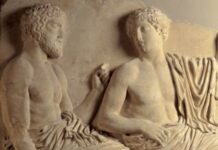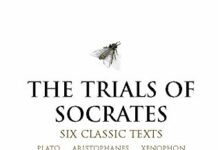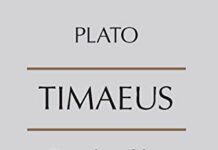
Ebook Info
- Published: 2013
- Number of pages:
- Format: PDF
- File Size: 13.36 MB
- Authors: Plato
Description
The Phaedo is acknowledged to be one of Plato’s masterpieces, showing him both as a philosopher and as a dramatist at the height of his powers. For its moving account of the execution of Socrates, the Phaedo ranks among the supreme literary achievements of antiquity. It is also a document crucial to the understanding of many ideas deeply ingrained in western culture, and provides one of the best introductions to Plato’s thought. This new edition is eminently suitable for readers new to Plato, offering a readable translation which is accessible without the aid of a commentary and assumes no prior knowledge of the ancient Greek world or language.
User’s Reviews
Reviews from Amazon users which were colected at the time this book was published on the website:
⭐The philosopher Plato, born in 427 BCE narrates the trial and death of his seventy-year-old teacher Socrates in 399 BCE in Athens, Greece in four of his dialogues. Socrates was accused of impiety and of corrupting the youth. The general consensus among today’s historians and scholars is that Socrates was innocent of the charges against him. However, the citizens of Athens felt differently during his time. Socrates was found guilty, was imprisoned, was able to meet with and talk with his friends before his death. He died by drinking hemlock given to him by his executioner.Plato presents Socrates’ defense of himself, which is quite persuasive. We will focus on one item: Socrates’ reactions to his impending death. It is one of several early discussions about death.The Apology reports Socrates thought about life after death and Phaedo quotes his last words. Both show his courage and fine character.In The Apology, Socrates’ friends are surprised that he is taking his impending death so calmly. One friend asks him what he thinks happens to people after their death. Socrates admits that he does not know, but sees two possibilities: either there is no afterworld or there is one. If there is no afterworld, there is nothing to worry about. Death will be like a dreamless sleep. Even the riches people on earth, who have all kinds of possessions and enjoy all kinds of activities and pleasures, delight in an undisturbed sleep. If, on the other hand, there is an afterlife, there is again no concern. The dead will enjoy meeting acquaintances and heroes of old; it will be a truly enjoyable and learning experience. Understanding this, he explained, he had no need to fear death; on the contrary, either way, there will be nothing bad after death.Phaedo shows that Socrates did not change his mood or mind. He drinks the hemlock and dies slowly, very calm, very accepting. He feels that he has lived a good life and is satisfied. As Socrates is about to die, this man who had been charged with corrupting the youth of Athens and of being impious, turns to his friend Crito and says, “Crito, we owe a cock to Aesculapius. Pay it and do not neglect it.” These were his last words.Phaedo end with a lamenting, but congratulatory comment by the person narrating the story, “Such was the end, Echecrates, of our friend, who was, as we may say, of all those of his time whom we have known, the best and wisest and most righteous man.”
⭐
⭐The absence of the text reference numbers made this version of the Phaedo almost useless in classroom setting.
⭐
⭐”Phaedo” is one of Plato’s best and most important works. Though well worth reading by itself, the fact that it is widely anthologized – e.g., in The Trial and Death of Socrates – makes it very hard to justify a standalone.Though apparently early and not as complex or philosophically influential as later ones, “Phaedo” is immensely important in portraying Socrates’ death. Along with the aforementioned dialogues, it is our clearest picture of the historical Socrates and would be invaluable for this alone. Indeed, I have read hundreds – perhaps thousands – of books, and this is one of my ten or so favorites, mostly because of how moving the depiction of the great man’s last days is. The story of Socrates’ last moments is part of world literature’s very fabric, an immortal part of Western cultural heritage. However, the works have great value even aside from this; a few have indeed questioned their historical veracity. This does not affect their philosophical, literary, and political worth, which is of the highest, making the book doubly essential.”Phaedo” ostensibly details Socrates’ last moments, including his last look at his wife and child, his last dialogue, his last words to friends, and his actual death. A large part of Socrates’ image comes from this, and its potential historical value is inconceivable, though its historicity can easily be doubted since the work itself strongly suggests that Plato was not there. Even so, it is likely accurate in regard to the things that really matter and certainly a fine account of how it very well could have been. It is extremely moving; shot through with pathos, it is one of the most affecting things I have ever read. One can surely not read it without being overcome by emotion; I can hardly even think of it without misty eyes. Anyone who respects and admires this central Western civilization figure will be profoundly touched; his famous last words seem comic out of context but are very much otherwise here, telling us much about Socrates and moving us yet further. This would be one of the greatest works of all-time if it had no other aspect, but it is also a fine dialogue appropriately dealing mostly with death. Plato examines perennial questions like the soul’s immortality and metempsychosis very thoroughly and thought-provokingly, and the conclusion – unsurprisingly, given the circumstances – has uncharacteristic certainty. It may not convince our cynical, empiricist, science-loving, twentieth century-surviving age, but the argument is certainly well-made and in many ways admirable. The dialogue touches on other important subjects also and is generally seen as the culmination of Plato’s early, Socrates-centered thought.The ever-important translation issue must also be kept in mind. It goes without saying that anyone who cares about intellectual issues, especially applied ones, must know Plato, as should anyone who wants to be even basically well-read. However, this is far easier said than done for most; he is so different from what now passes for literature, to say nothing of pop culture, that he is virtually inaccessible to general readers. Yet the importance of persevering cannot be overemphasized; the payoff is well worth the effort. As nearly always in such cases, reading him becomes far easier after the initial difficulty; no attentive reader will ever think Plato easy reading, but he is utterly absorbing once we get used to his style. He has a near-poetic beauty that all agree has never even been remotely approached in philosophy, and such mesmerizing prose is rare in any genre. His dialogues are an incredible form at once intellectually and aesthetically pleasing – an inspired combination that has perhaps never been bettered; many have appropriated it, but none have matched it. All this means that picking the right translation is probably more important with Plato than any other writer. This Benjamin Jowett translation is now quite old but still very accessible; it will work quite well for most, but anyone struggling should try a more recent version. For the average reader, the more recent, the better is generally true. The important thing is to read Plato in some form, and those who happen on a translation that does not work for them should keep trying until their mind opens in a truly new way – and once done, it will never close again.
⭐
⭐Un classico, ormai, ma sempre eccellente
⭐
⭐ページ数から注がちゃんと入っているものを買いたいと思い、注文しました。でも、リプリントでした。まあ、プラトンの名前しかないところで疑うべきでした。判読しかねる文字が多々あります。目の良い人、ギリシア語が堪能な方むきです。
⭐
Keywords
Free Download Phaedo in PDF format
Phaedo PDF Free Download
Download Phaedo 2013 PDF Free
Phaedo 2013 PDF Free Download
Download Phaedo PDF
Free Download Ebook Phaedo




